

Cisco Command Summary. Dynamically Loaded (DL) Libraries. Dynamically loaded (DL) libraries are libraries that are loaded at times other than during the startup of a program.
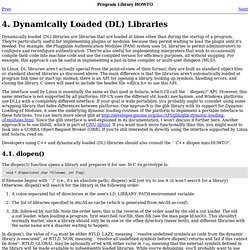
They're particularly useful for implementing plugins or modules, because they permit waiting to load the plugin until it's needed. For example, the Pluggable Authentication Modules (PAM) system uses DL libraries to permit administrators to configure and reconfigure authentication. They're also useful for implementing interpreters that wish to occasionally compile their code into machine code and use the compiled version for efficiency purposes, all without stopping. For example, this approach can be useful in implementing a just-in-time compiler or multi-user dungeon (MUD). In Linux, DL libraries aren't actually special from the point-of-view of their format; they are built as standard object files or standard shared libraries as discussed above. The interface used by Linux is essentially the same as that used in Solaris, which I'll call the ``dlopen()'' API.
Shared Libraries. Shared libraries are libraries that are loaded by programs when they start.
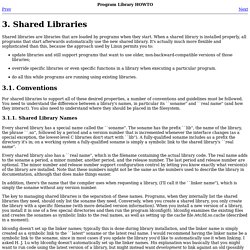
When a shared library is installed properly, all programs that start afterwards automatically use the new shared library. It's actually much more flexible and sophisticated than this, because the approach used by Linux permits you to: Modifying a Dynamic Library Without Changing the Source Code. Sometimes, you might want to determine what is happening in a shared library without modifying the library (have you tried to build glibc lately?). Other times, you might want to override only a few functions within a library and get them to do something else--force a process to a specific CPU, prevent a specific USB message from being sent and so on. All of these tasks are possible if you use the LD_PRELOAD environment variable and a small shim program placed between the application and the library. Using static and shared libraries across platforms. I produced hereafter some information about shared libraries on different systems.
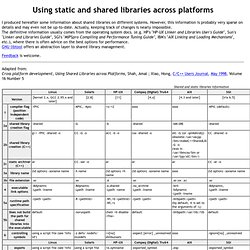
However, this information is probably very sparse on details and may even not be up-to-date. Actually, keeping track of changes is nearly impossible. The definitive information usually comes from the operating system docs. Beginner's Guide to Linkers. This article is intended to help C & C++ programmers understand the essentials of what the linker does.

I've explained this to a number of colleagues over the years, so I decided it was time to write it down so that it's more widely available (and so that I don't have to explain it again). [Updated March 2009 to include more information on the pecularities of linking on Windows, plus some clarification on the one definition rule.] A typical example of what triggers this explanation is when I help someone who has a link error like: If your reaction to this is 'almost certainly missing extern "C"' then you probably already know everything in this article. Table of Contents. System Call Table. From WikiContent The kernel is the heart of an operating system.
It is responsible for such core functionality as memory management, process scheduling, TCP/IP networking, and so on. Section 7.2. Intercepting System Calls. 7.2.
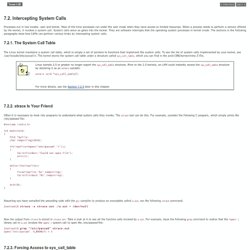
Intercepting System Calls Processes run in two modes: user and kernel. Most of the time processes run under the user mode when they have access to limited resources. Interrupt and exception handling. Minou/ldx-box. Ld.so () NOTE: click here if you get an empty page. LD.SO(8) Linux Programmer's Manual LD.SO(8) ld.so, ld-linux.so* - dynamic linker/loader The programs ld.so and ld-linux.so* find and load the shared libraries needed by a program, prepare the program to run, and then run it. What is the debian way to update Library path? Library Interposer. Intercept file open system call. Tuning with Library Interposers. Oracle Technology Network > Java Software Downloads View All Downloads Top Downloads New Downloads What's New Java in the Cloud: Rapidly develop and deploy Java business applications in the cloud.

Essential Links Developer Spotlight Java EE—the Most Lightweight Enterprise Framework? Blogs Technologies Contact Us About Oracle Cloud Events Top Actions News Key Topics Oracle Integrated Cloud Applications & Platform Services. Building library interposers for fun and profit. April 11, 2001, 1:50 PM — Summary: Library interposition is a useful technique for tuning performance, collecting runtime statistics, or debugging applications.
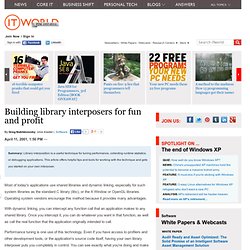
This article offers helpful tips and tools for working with the technique and gets you started on your own interposer. Most of today's applications use shared libraries and dynamic linking, especially for such system libraries as the standard C library (libc), or the X Window or OpenGL libraries. Operating system vendors encourage this method because it provides many advantages. With dynamic linking, you can intercept any function call that an application makes to any shared library. HELP! Problem getting interposer/LD_PRELOAD working - comp.unix.programmer. Intercepting system calls on Linux. The Commodore 64 Emulator: Emulating Pointers in a sandbox when the real thing is not allowed. Late last week, I cracked open the Commodore 64 emulator code once again, in preparation to post it.
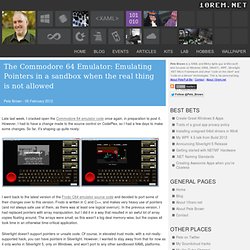
However, I had to have a change made to the source control on CodePlex, so I had a few days to make some changes. Using Assembly Language in Linux. By Phillip phillip@ussrback.com.
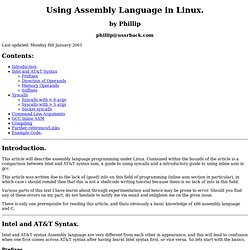
How to create a lightweight C code sandbox. Secure C Programming.